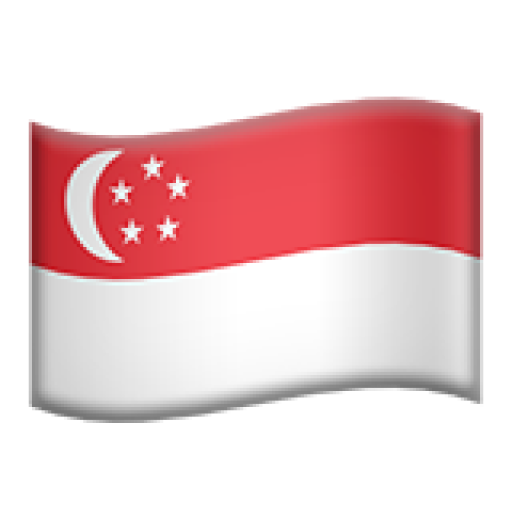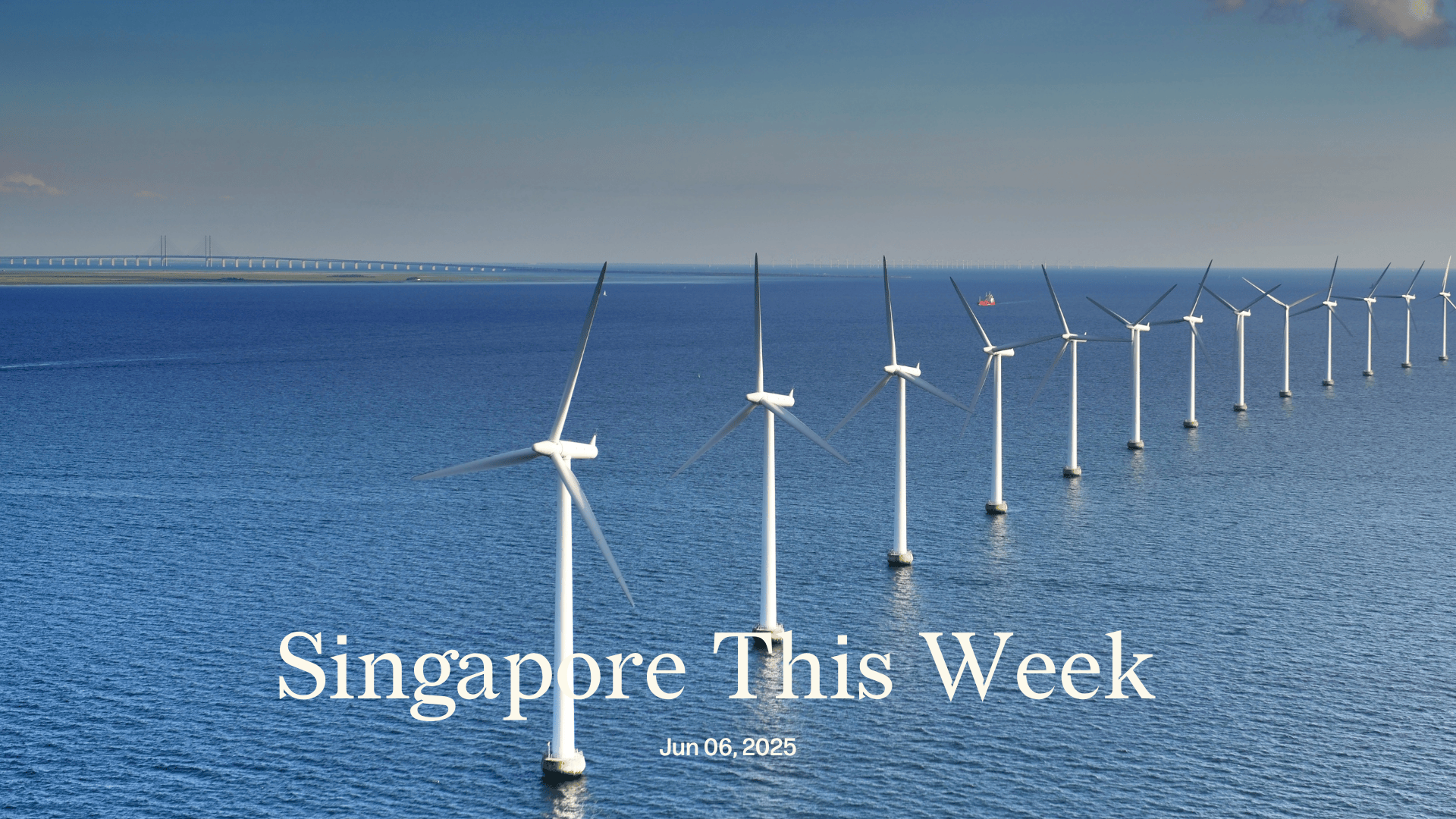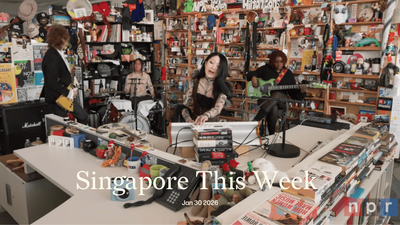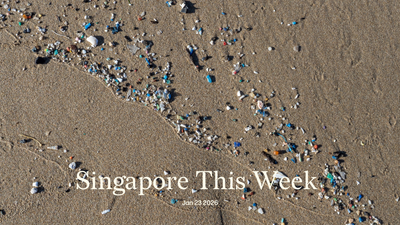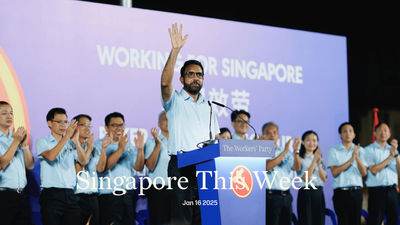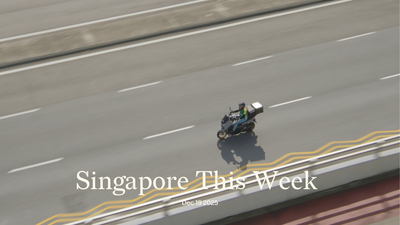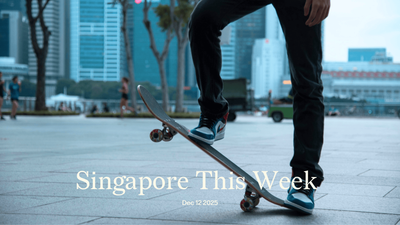Politics: Turning up the heat on Israel or diplomatic shadow play?
Last Friday, Jom reported that the Singapore government had offered “barely a whimper” to the latest round of devastation in Gaza. That has changed. The same day, Lawrence Wong, prime minister, said that “the restrictions imposed on the delivery of humanitarian supplies are completely unacceptable” and may be “a likely breach of international humanitarian law.” A day later, Faishal Ibrahim, acting minister-in-charge of Muslim affairs, said that he agreed with Ehud Olmert, former Israel prime minister, that Israel is committing war crimes in Gaza. “It pains me to say this, considering Israel’s contributions to Singapore in our early years,” he said, alluding, intentionally or not, to the fact that 60 years is a long time, and positions can change when facts do. It’s curious that Faishal seemed to defer to the moral authority of a former Israeli prime minister, rather than expressing his own clear opinion or referencing the numerous international scholars and bodies, including the International Criminal Court, who’ve long said the same.
Still, never before have Singaporean leaders condemned Israeli aggression against Palestinians to this extent. But is this a seminal shift, or simply the continuation of a decades-long shadow play? “Wayang was, perhaps, our original sin,” Jom had written last year. “And because of this it’s fair for all citizens to be a little sceptical about anything that Israeli or Singaporean leaders say publicly about our countries’s ties…While Singapore officially cultivates a close friendship with Israel, it purports to do the same with the Palestinians. In Israel-Asia Relations in the Twenty-First Century, a book published last year [2023], political analysts Kevjn Lim and Mattia Tomba cited sources close to the MFA [Ministry of Foreign Affairs] who claimed that Singapore generally supports Palestinian resolutions at the UN ‘irrespective of what we may think of their merits, in order to give ourselves political cover to develop substantive relationships with Israel.’”
Are Faishal’s and Wong’s statements performative, to appease the growing lobby of Singaporeans, especially Malay Muslims, sympathetic to the Palestinian cause? Or is the ruling People’s Action Party (PAP) actually getting closer to interrogating Singapore’s historical relationship with Israel, especially our military kinship? Recall, among many other things, this saw Israeli arms makers leveraging Gaza devastation at the Singapore Airshow last year to hawk weapons to regional autocrats. Whatever the case, now that the political space has widened, ordinary Singaporeans keen on change should keep up the democratic pressure that, since October 7th 2023, has seen our leaders repeatedly caught on the backfoot by shifting societal sentiments on the Israel-Palestine question.
International: Tanks, not trade
At last year’s Shangri-La Dialogue, the annual security powwow organised by the London-based International Institute for Strategic Studies, Volodymyr Zelensky, Ukrainian president, made a surprise visit and scolded China for its apparent pro-Russia meddling. This year it was the turn of Pete Hegseth, US defence secretary, who warned of an “imminent” threat from China, referencing the South China Sea and Taiwan. He urged Asian countries to raise their defence spending. “NATO members are pledging to spend five percent of their GDP on defense,” he said, referencing demands by Donald Trump, US president. “So it doesn’t make sense for countries in Europe to do that while key allies in Asia spend less on defense in the face of an even more formidable threat.” (Most South-east Asian countries spend under 1.5 percent; South Korea spends 2.6 percent; Singapore, an outlier, already spends about three percent of GDP on defence, more than it does on education.)
Alan Chong of the S. Rajaratnam School of International Studies (RSIS) portrayed Hegseth’s comments as “provocative and often hostile language reminiscent of the interwar years”. For the first time since 2019, Beijing didn’t send a top defence official to the summit. But it subsequently criticised the US for using it to “create disputes, sow discord, provoke confrontation and seek selfish interests”. Kevin Chen, also from RSIS, argued that Hegseth seemed to be addressing a domestic audience rather than those present in Singapore, with his references to the “invasion of 21 million illegals” and other MAGA tropes. “The apparent gulf between what South-east Asian governments and Washington consider important, including a confrontational approach to China and dismissal of climate change, may hinder cooperation going forward.”
Perhaps most worryingly for South-east Asia’s trade-dependent countries, Hegseth declined to discuss Trump’s turbulent, troubling tariffs: “I’m happily in the business of tanks, not trade.” Anwar Ibrahim, Malaysia’s prime minister, criticised “the onslaught of arbitrary imposition of trade restrictions”. He added: “What holds true for us holds true elsewhere— where trade flourishes, stability follows. When it falters, the consequences ripple far beyond any one region.” Kaja Kallas, the EU’s top diplomat, also stressed the importance of economic interdependence, and sought to position the bloc as a more reliable partner than the US for Asia.
Chan Chun Sing, Singapore’s new defence minister, said that it was a “geostrategic reality” for South-east Asian states to engage with China, the US, and others. “If we have to choose sides, may we choose the side of principles—principles that uphold a global order, where we do not descend into the law of the jungle, where the mighty do what they wish and the weak suffer what they must.” And yet, as the 2003 Iraq war showed, Singapore will happily ignore the rules-based order to support a larger power against a smaller one when it’s expedient. As always, ordinary people are left to wonder, as we watch the theatricality of global diplomacy in five-star hotels, if the Masters of War mean what they’re saying, or even know what they’re doing.
Society: Are mules victims or perpetrators?
In episode six of “Scam Inc”, a new podcast series by The Economist, host Sue-Lin Wong interviews “Daniel”, a young Singaporean who spoke about becoming a money mule for scam syndicates in 2021 when he was 17. After secondary school, he had taken odd jobs, his favourite being a part-time dishwasher. (“Work long hours.” “Spray water on each other.” “Break plates.”) But the pay sucked. A former classmate asked Daniel if he was keen to earn more. All he had to do was open a bank account in his name, use a designated phone number on the account, and hand over his bank card once opened. For each account opened, he’d get S$800 in cash, about double his monthly salary. So he did. Soon, hundreds of thousands of dollars were flowing through his accounts. Stacks of bank statements with these ludicrous amounts showed up in his mailbox, which were seen by his mum. Within weeks, a bank locked one of his cards and froze the account, pending review. Daniel got out in time, but several of his friends ended up in jail.
This is the human dimension behind the 41 Singaporeans who were charged this week for allegedly acting as money mules, by allowing these syndicates to access their bank accounts or SingPass credentials. The youngest accused is 16, one of many youths ensnared. Presumably just like Daniel, they had aspirations for a better life in one of the world’s most unequal and expensive cities.
That’s not to excuse the crime. As a “tiny piece of a much, much bigger ecosystem”, in Wong’s words, mules play an important, if unwitting, role in helping launder scam proceeds. (Perhaps even from the likes of Su Haijin and others in the Fujian gang.) The global online scams industry is now probably worth over US$500bn (S$686bn) a year, said The Economist, and “may already be as big a scourge as illegal drugs”. Scam victims in Singapore lost S$1.1bn last year, a record high. To fall prey to a scam can be devastating for victims and their families, with some pushed to suicide.
Still, as the podcast makes clear, for most lower-level operatives, particularly those lured by the promise of a call-centre job but actually trafficked to work in scam factories, the line between being a victim and perpetrator is often hazy. So while firm action is needed against mules, it’s just as important for society to continually ask how we can temper inequality, raise the incomes of those at the bottom, and change their circumstance so that one can work as a dishwasher with a living wage and dignity.
Note: We have about 30 tickets left for our Jom Cakap event on June 24th at The Projector—The Economist’s Sue-Lin Wong in conversation with Jom’s Corrie Tan about “Scam Inc”. Get yours now.
Society: A new hope
Parkinson’s disease has perplexed scientists for centuries. The condition manifests as a terrible medley of worsening symptoms that include muscle tremors and rigidity, slow movement, poor balance, and, in some cases, cognitive decline. The “why” still eludes us, but the “how” is known—neurons that produce dopamine, a chemical critical for movement, become damaged and ultimately start dying. Treatment usually involves pharmaceutical and/or electrical stimulation that kickstarts the brain into producing more dopamine; or medicines that prevent dopamine breakdown. Both approaches can slow the decline, but neither can stop or reverse it. Private and public funding into research for a cure has steadily increased, partly because of high-profile patients like boxer Muhammad Ali, and actor Michael J Fox. The latter’s eponymous foundation, whose goal is “putting ourselves out of business by finding the cure for Parkinson’s”, has raised more than US$2bn (S$2.6bn) since it was founded a quarter century ago. Meanwhile, the US’s National Institute for Health (NIH), currently under threat from Donald Trump, president, allocated US$253m (S$326m) in funding for Parkinson’s research in financial year 2023-24 alone.
Parkinson’s is of particular concern in Singapore, with its rapidly aging population. Last week, the country’s National Medical Research Council awarded S$25m to a research team at the National Neuroscience Institute (NNI) to conduct a small-scale trial, the first of its kind here, for a novel therapy that involves transplanting stem cells harvested from individual patients into their own brains. The hope is that these stem cells will develop into dopamine-producing neurons to make up for damaged or dead ones. A Japanese trial showed increased dopamine production, with a concomitant easing of symptoms after stem cells were injected into the brains of seven patients. Another one, in North America, showed similar benefits using stem cells derived from human embryos, not patients. The trials were small but given the long and futile search for anything remotely resembling a cure, they have caused quite a stir. “[N]ow we have the potential to really, really halt this disease in its tracks,” said one researcher.
As talented scientists do their thing, is there something us layfolks can do to stave off the disease? Exercise, yawn. (Seriously though, exercise is vital). Also, coffee. A 2023 NNI study found that just two cups of daily kopi—the beloved local brew made with Robusta beans that have more caffeine than the Arabica ones used in Western variants—can reduce the risk of Parkinson’s by four to eight times in Asians who’re genetically predisposed to it. Yet another reason to choose kopi c siu dai over a latte.
Society: Responsibility of the power grid
Plans for an ASEAN power grid have received a jolt following a deal to lay a subsea electricity cable between Indonesia and Singapore. The idea for a regional power grid was first tabled in the late 1990s under ASEAN Vision 2020, and has been consistently championed by the city-state. Experts note that Singapore is well-positioned to become a green power hub, with its strategic location and advanced infrastructure, acting as a central node for regional interconnection. Research from Rystad Energy said that realising all proposed interconnections could unlock up to 25 gigawatts (GW) of renewable and energy storage projects spanning hydropower, solar and offshore wind in South-east Asia, with the potential to reduce annual emissions by up to 13m tonnes of carbon dioxide equivalent.
Many South-east Asian countries have begun their renewable energy transition. But it’s Singapore, a “renewable energy-disadvantaged” nation with its geographical challenges—small size, urban density, relatively flat land and lack of geothermal resources—which stands to benefit the most from a regional grid. Importing clean energy not only supports the city-state’s decarbonisation efforts—95 percent of electricity generation now relies on natural gas, a fossil fuel—it’s a cost-effective way to meet its 2030 climate targets and long-term sustainability goals. Diversifying the country’s energy supply also enhances energy resilience and potentially lowers electricity costs.
But all this at what cost and for whose gain? Green energy development, whatever its merits, has a social and environmental impact on vulnerable communities in our neighbourhood, including through displacement, land degradation and environmental damage. Hydropower projects in Cambodia, Laos and Vietnam, for instance, have driven out indigenous populations, disrupted river ecosystems, affecting livelihoods and food security. While mineral extraction in Indonesia for renewable energy technologies has led to land grabs and conflicts with local populations. A just and inclusive, people-centric transition to clean energy necessitates that rich nations like Singapore avoid prioritising energy security at the expense of regional public interest. One solution perhaps is to involve local communities in the planning and implementation of renewable energy projects, considering their needs and concerns in the process.
Some further reading: In “Singapore is not an island”, the SG Climate Rally calls for bolder steps towards regional climate action.
History weekly by Faris Joraimi
At Cyrene Reef, and in the waters off Changi, Pulau Ubin, and Pulau Semakau, lie undulating beds of seagrass. Seahorses and sea stars dwell among the long green blades, while turtles come to feed. Generations of fish sheltered and nursed their young here. Perhaps their most marvellous visitors are the dugongs, placid herbivores that have grazed on seagrass for as long as those aquatic plants have transmuted sunlight into food. Depending on whom you ask, and how you look, dugongs are either alluring ladies of the sea, or zoological curiosities. In 1934, Minahassan fishermen off northeastern Sulawesi accidentally captured a “perempuan laut” (sea woman). She was sold to the local Dutch colonial officer, covered by the press, and displayed to the public, thereby changing from a “mermaid” to an object of science. Reports portrayed it as a peculiar mixture of woman, cow, and whale; it was a young specimen, this-heavy and that-much-long. Two weeks later, after being observed by thousands at the aquarium in Batavia (present-day Jakarta), the creature died.
Dugongs and manatees are thought to have inspired legends of mermaids and sirens, female beings who lured lost and desperate seafarers to death with their beauty and song. To be sure, this is a sexist trope that goes all the way back to the Greeks. In our waters, though, it’s not the mermaids themselves that are the source of dangerous temptation, but the humans who extract their power. Malays collected dugongs’s tears, air mata duyung, as a vital ingredient in love potions. The Minahassan fishermen were also reported to soak up the tears of their distressed captive with cotton cloth for a similar purpose. On the south coast of Java, beached dugongs’s tears were collected and used in fragrant oils that enhance fertility when applied on the eyebrows. Dugong sex magic suggests some connection with the myths of seductive mermaids. Although, who are we to say they aren’t the same creature? Who knows how many swear by the bedroom charm worked by a mermaid’s teardrops? Even in science, which took from Adam the power to name all Creation, the myth endures: dugongs and manatees comprise four species in the genus Sirenia, the sirens. Our “Cyrene Reef”, the name that Europeans gave to Terumbu Pandan, must have come from common dugong sightings among its abundant seagrass. Scientists recently declared that the seagrass meadows of the Indo-Pacific ocean, which includes Singapore, are unusually good at capturing and storing carbon compared to seagrasses elsewhere. Wonders haven’t ceased in the mermaid’s garden.
Arts: It’s a man’s, man’s, man’s world
So crooned James Brown in the song that The Rolling Stone called “biblically chauvinistic”. It’s still very much a man’s world out here. But, some 60 years later, Brown’s parting shot has stuck: “He’s lost in the wilderness, he’s lost in bitterness, he’s lost, lord have mercy now, in loneliness.” In a post-MeToo era characterised by catchphrases like “toxic masculinity”, “the manosphere”, “incels” and, most recently, the popularity of TV series “Adolescence”, Singaporean theatre companies are now taking on the wild, bitter loneliness of the lost modern man, but also ways he might be found. “No Man’s Land”, the upcoming offering from theatre vanguard The Necessary Stage, follows four men as they pick their way across the tricky terrain of contemporary manhood. This devised work, created in collaboration with all its performers, draws from their wide variety of experiences with, and of, masculinity. Each member of the creative team has contributed personal narratives to the work, which incorporates both theatre and dance. Expect everything from grunty gym bro culture to an elderly father’s unspoken expectations of his son, drawn from formative experiences of all-male environments like boys’ schools and national service, but also observations of how chores are divvied up by gender in the home. Sim Yan Ying “YY”, co-director, had previously conceptualised “pass•ages”, a 2024 work that bears witness to four women at different life stages. She told The Straits Times (ST): “Over time, I grew curious about the other side as well—while obviously acknowledging that gender is not a binary. In all my attempts to advocate for gender equality, I feel like you can’t really achieve that without addressing masculinity.”
Another company, Sight Lines Theatre, has recently concluded its adaptation of “The Pillowman” by British-Irish playwright Martin McDonagh. In this harrowing psychological thriller, a writer is interrogated by police about his violent short stories and their morbid similarities to a string of child murders in the town he lives in. Its director, Chong Tze Chien, chose to focus on masculinity. “The male gender is forced to look at our place in society and the way we conduct ourselves,” he told ST. “We are all now revisiting that and questioning where the seed of gender norms comes from. Is it inherently in us? Or is it planted?” Chong, who’s also the incoming director of the Singapore International Festival of Arts, had his all-male cast rotate through all the characters in the show, with two actors sometimes playing the same character at the same time, to offer audiences different versions of both its protagonists and peripheral figures, but also different interpretations of the truth. Though, like the protagonist of Brown’s song, it can often feel like we’re all lost in the wilderness, or in loneliness—it is through this multiplicity of approaches that we can find ways to worldbuild anew.
Tech: Feeling safe with AI
Between March and May this year, the AI Verify Foundation and its parent body, the Infocomm Media Development Authority (IMDA), assessed the GenAI applications of 17 organisations in a study called the Global AI Assurance Pilot. Participants included hospitals, airports, insurers, banks, and wealth management firms. The results have demonstrated both the potential and limitations of current GenAI systems. For instance, the clinical summary tool at Changi General Hospital lagged behind the preset standard in extracting clinical information from colonoscopy reports. Yet, the tool was able to make the correct recommendations in many cases, perhaps because “a recommendation could be the result of multiple criteria, so even if one of them was assessed incorrectly, others could result in the same recommendation.” This shows promise in streamlining complex medical workflows, but also continues to underscore the need for rigorous accuracy checks against medical guidelines. Tests conducted on GenAI applications of companies in other sectors led researchers to similar conclusions: in the short-term at least, human intervention will continue to be vital in critical industries and settings.
The insights gleaned from the pilot will feed Project Moonshot, launched last year by IMDA and the AI Verify Foundation. Moonshot is an evolving starter kit of tools to help companies and developers test their GenAI apps across four areas: “hallucination”, where the models simply make up sources and information; undesirable content; data disclosure; and “adversarial prompts”, meant to manipulate models. This is a significant advancement in AI governance, moving beyond theoretical frameworks to provide actionable methodologies for developers. As Project Moonshot’s tools become available, Singapore’s approach could set a global benchmark for implementing GenAI solutions that are not just cutting-edge, but operationally sound and visibly reliable.
Tech: Coming full circle
A decade ago, getting a SIM card was a chore, and data was costly. That was until digital telcos such as Circles.Life started offering significantly cheaper data plans. Now, the company is charting an ambitious path toward dual listings on the SGX and Nasdaq, signalling confidence in its diversified business model. The potential IPOs in the next two years would capitalise on the strong performance of its B2B software arm, Circles X, which has surpassed US$100m (S$128.6m) in annual revenue with 30 percent growth over the past year and 70 percent gross margins. This unit, powering telcos in markets from Japan to Mexico, has become the company’s crown jewel, attracting partnerships with industry giants like AT&T.
Circles’s move comes after a 2024 restructuring that split operations into three verticals: software, core telco services, and travel eSIM business Jetpac. With all units now having achieved their break-even points, the company aims to use its Nasdaq debut to tap into deeper tech liquidity while leveraging an SGX listing to fund regional expansion. This could be seen as an endorsement of Singapore’s push to revitalise its stock market through incentives like tax rebates, though success will hinge on improving investor appetite for local listings. If that comes to pass, it would mark yet another home grown tech startup coming full circle since starting over a decade ago, in 2014.
If you enjoy Jom’s work, do get a paid subscription today to support independent journalism in Singapore.

